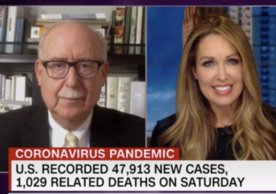
The World Health Organization published the first global report on the state of nursing in 2020, documenting that 59% of all health workforces are nurses. Despite this, nursing’s contributions are not always recognized—and arguably, what cannot be seen cannot be understood or valued. When the “Woodhull Study on Nursing and the Media: Health Care’s Invisible Partner” was published in 1998, it found that nurses were identified as sources in only 4% of quotes or other sourcing in health news stories in leading national and regional newspapers. Nurses were never cited in health news stories on policy. As for the accompanying photos, nurses were rarely identified.
The study was revisited in 2018 with similarly dismal results. Nurses were quoted as sources only 2% of the time, and their voices remained unheard in health policy pieces. When quoted, nurses mainly commented on the profession itself, not their areas of subject matter expertise. Nurses were identified in 4% of accompanying photographs or other images.
YSN faculty are looking to move those numbers—and the stories of impact that they represent—upward. Over the past six months, YSN nurses have been interviewed and quoted in local and national print and broadcast media for their clinical expertise and awareness of how policy effects patients. YSN faculty have also contributed to the burgeoning area dissecting health disparities.
CLINICAL EXPERTISE
The Wall Street Journal discussed prioritizing COVID-19 vaccines for health workers and first responders with Saad B. Omer.
Mother Jones talked to Saad B. Omer on the importance of the Biden administration utilizing science communicators.
The Hill included a tweet from Saad B. Omer about the importance and limitations of masks:
NBC News discussed potentially unpleasant COVID-19 vaccine side effects with Saad B. Omer.
The Wall Street Journal interviewed Saad B. Omer about Moderna’s COVID-19 vaccine.
The Baltimore Sun talked to Saad B. Omer about Pfizer’s vaccine distribution plans.
New York Daily News ran a piece that included comments from David Vlahov on why passengers should refrain from talking on the NYC subway.
NBCNews.com quoted Saad B. Omer in a story about why individual states should not vet COVID-19 vaccines themselves.
Radio.com spoke to Saad B. Omer about the levels of COVID-19 infection that might result in herd immunity.
NPR talked to Michelle Telfer about post-partum care.
The Atlantic Daily newsletter talked to David Vlahov about the flu shot.
The New York Times wrote a piece about the safety review of AstraZeneca’s vaccine trial and spoke with Saad B. Omer in his capacity as a vaccine expert.
The Wall Street Journal discussed herd immunity with Saad B. Omer.
The Baltimore Sun quoted Saad B. Omer’s concerns about coronavirus vaccine makers keeping safety details quiet.
Discover Magazine talked to Saad B. Omer about the logistics of multiple COVID-19 vaccines reaching the marketplace.
The Washington Post talked to Saad B. Omer about the high expectations for a COVID-19 vaccine.
The Atlantic interviewed David Vlahov on how winter will impact social distancing and the spread of the virus.
Oncology Nursing News discussed immune-related adverse events (irAEs) with Marianne J. Davies.
Oncology Live contacted Marianne J. Davies to discuss irAEs.
The New York Times tapped Saad B. Omer for his expertise on herd immunity.
The Wall Street Journal discussed vaccine hesitancy with Saad B. Omer.
The New York Times talked to postdoctoral associate Eileen Condon about how stressors related to the pandemic disproportionately harm disadvantaged and marginalized families.
Today discussed the safety of outdoor fitness classes with Saad B. Omer.
CNBC spoke to Saad B. Omer about the importance of COVID-19 antibody testing.
HEALTH DISPARITIES
The Gilder Lehrman Center for the Study of Slavery, Resistance, and Abolition spoke with Sascha James-Conterelli on race, health, and medicine in times of COVID-19.
“I was just on Governor Cuomo’s COVID-19 Maternal Task Force … Related to maternity care in New York, especially New York City, we had to make rapid decisions about healthcare and policies and policy changes, sometimes within an hour.”
STAT sought Saad B. Omer’s expertise on vaccine acceptance in an article about a Black doctors’ group that created its own expert panel to vet COVID-19 vaccines.
The Tampa Bay Times discussed racial health disparities in Florida with David Vlahov.
The New York Times talked to Sascha James-Conterelli about maternal mortality and disparate racial outcomes.
Medscape quoted LaRon E. Nelson on the topic of equity in COVID-19 recovery.
The BodyPro interviewed LaRon E. Nelson on the issue of COVID-19 and HIV disparities and how racism, not race, is the root cause of the inequity.
The New York Times spoke to Eileen Condon about the possibly lasting effects of the pandemic on Black families and Black children.
POLICY DECISIONS
Newsweek included remarks from David Vlahov on how politics should be set aside to limit a second wave of COVID-19.
CNN interviewed David Vlahov about COVID-19 testing.
The San Jose Mercury News compared the COVID-19 responses of New York and California with David Vlahov.
The Lancet published an open letter from Dean Ann Kurth, Yale School of Public Health Dean Sten Vermund, and other colleagues decrying US withdrawal from WHO as unlawful and dangerous.
Stamford Advocate talked with Saad B. Omer about funding shortages in US public health.
The Washington Post published an op-ed by Saad B. Omer about reforming the CDC.
NationalInterest.org ran a piece from Saad B. Omer about the dangers of President Trump’s decision to halt WHO funding.
